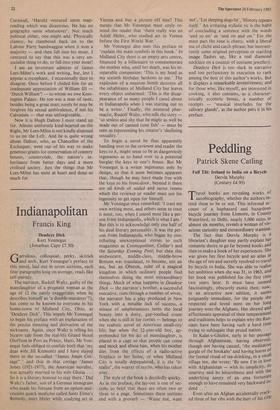Indianapolitan
Francis King
Garrulous, colloquial, perky, skittish and arch, Kurt Vonnegut's preface to this novel, laid out in seven sections, each four paragraphs long on average, reads like sel f-parody.
The narrator, Rudolf Waltz, guilty of the manslaughter of a pregnant woman at the age of 12 (he surely exaggerates when he describes himself as 'a double-murderer'?), has come to be known to everyone in his home-town of Midland City, Ohio, as 'Deadeye Dick'. This impels Mr Vonnegut to begin his preface with an explanation of the precise meaning and derivation of the nickname. Again, since Waltz is telling his bizarre tale from the real-life Grand Hotel Oloffson in Port au Prince, Haiti, Mr Von: negut feels obliged to confide both that 'my dear wife Jill Krcmentz and I have stayed there in the so-called "James Jones Cot- tage" ' and that in that cottage 'James Jones (1921-1977), the American novelist, was actually married to his wife Gloria So it is a literary honour to stay there.' Did Waltz's father, son of a German immigrant who made his fortune from an opium-and- cocaine quack medicine called Saint Elmo's Remedy, meet Hitler while studying art in Vienna and buy a picture off him? This means that Mr Vonnegut must coyly re- mind the reader that 'there really was an Adolf Hitler, who studied art in Vienna before the First World War.'
Mr Vonnegut also uses this preface to 'explain the main symbols in this book.' In Midland City there is an empty arts centre, financed by a billionaire to commemorate the mother who, until her death, was his in- separable companion: 'This is my head as my sixtieth birthday beckons to me.' The explosion of a neutron bomb destroys all the inhabitants of Midland City but leaves every object unharmed: 'This is the disap- pearance of so many people l cared about in Indianapolis when I was starting out to be a writer.' Finally, the neutered phar- macist, Rudolf Waltz, who tells the story `so sexless and shy that he might as well be made out of canned tuna fish' — must be seen as representing his creator's 'declining sexuality.'
To begin a novel by thus apparently handing over to the reviewer and reader the keys to it, might seem to be as dangerously ingenuous as to hand over to a potential burglar the keys to one's house. But Mr Vonnegut is a writer ingenuous only by design, so that it soon becomes apparent that, though he may have made free with the keys to his front-door, beyond it there are all kinds of sealed and secret rooms which the reviewer or reader must use his ingenuity to get open for himself.
Mr Vonnegut once remarked: 'I trust my own writing most, and others seem to trust it most, too, when I sound most like a per- son from Indianapolis, which is what 1 am.' But this is to acknowledge only one half of his dual literary personality. It was the per- son from Indianapolis who began by con- tributing unexceptional stories to such magazines as Cosmopolitan, Collier's and the Saturday Evening Post; but then this midwestern, middle-class, middle-brow Bottom was translated, to become, not an ass, but an Oberon, ruler of a magical kingdom in which ordinary people find themselves doing the most extraordinary things. Much of what happens in Deadeye Dick — the narrator's brother, a successful executive, runs through a number of wives, the narrator has a play produced in New York with a notable lack of success, a misuse of amphetamines turns the local beauty into a dotty, gap-toothed crone when she is still in her forties — belongs to the realistic novel of American small-city life; but when the 12-year-old boy, ap- prehended for his act of manslaughter, is placed in a cage so that people can come and mock and abuse him, when his mother dies from the effects of a radio-active fireplace in her home, or when Midland City is totally depopulated, it is the 'ir- realist', the weaver of myths, who has taken over.
The style of the book is decidedly quirky. As in the preface, the lay-out is one of sec- tions so brief that there are often two or three to a page. Sometimes these sections end with a proverb — 'Waste not, want not', 'Let sleeping dogs lie', 'History repeats itself.' An irritating stylistic tic is the habit of concluding a sentence with the words `and so on' or 'and on and on.' For the most part the tone is chatty, with a liberal use of cliche and catch-phrase; but intermit- tently some original perception or startling image flashes up, like a real diamond necklace on a counter of costume jewellery.
Deadeye Dick is too slack in narrative and too perfunctory in execution to rank among the best of this author's works. But it displays a remarkable inventiveness; and for those who, like myself, are interested in cooking, it also contains, as a character- istically eccentric bonus, a number of receipts — 'musical interludes for the salivary glands', as the author puts it in his preface.










































 Previous page
Previous page